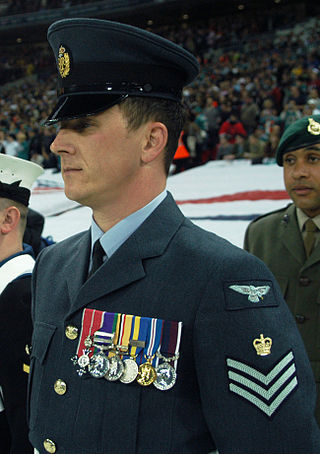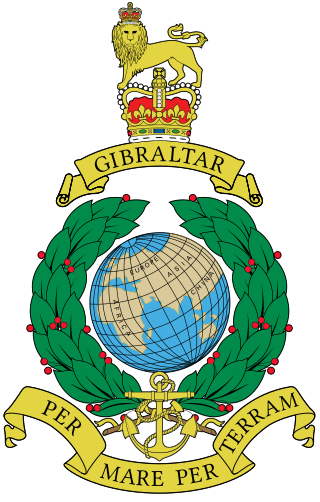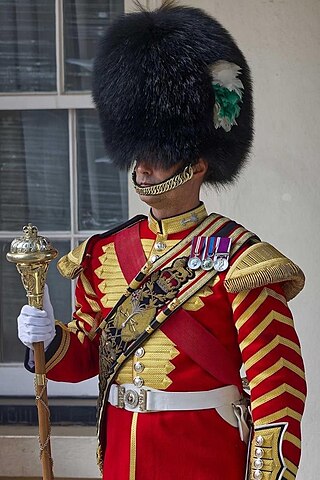Warrant officer (WO) is a rank or category of ranks in the armed forces of many countries. Depending on the country, service, or historical context, warrant officers are sometimes classified as the most junior of the commissioned officer ranks, the most senior of the non-commissioned officer (NCO) ranks, or in a separate category of their own. Warrant officer ranks are especially prominent in the militaries of Commonwealth nations and the United States.
Sergeant (Sgt) is a rank in use by the armed forces of many countries. It is also a police rank in some police services. The alternative spelling, serjeant, is used in The Rifles and other units that draw their heritage from the British light infantry. Its origin is the Latin serviens, 'one who serves', through the Old French term serjant.
Corporal is a military rank in use by the armed forces of many countries. It is also a police rank in some police services. The rank is usually the lowest ranking non-commissioned officer. In some militaries, the rank of corporal nominally corresponds to commanding a section or squad of soldiers.
Staff sergeant is a rank of non-commissioned officer used in the armed forces of many countries. It is also a police rank in some police services.
Sergeant major is a senior non-commissioned rank or appointment in many militaries around the world.

Colour sergeant is a rank of non-commissioned officer found in several armies and marine corps.
Chief Warrant officer is a senior warrant officer rank, used in many countries.
Officer Cadet is a rank held by military cadets during their training to become commissioned officers. In the United Kingdom, the rank is also used by members of University Royal Naval Units, University Officer Training Corps and University Air Squadron; however, these are not trainee officers with many not choosing a career in the armed forces.

"Other ranks" is the term used to refer to all ranks below officers in the British Army and the Royal Marines. It includes warrant officers, non-commissioned officers ("NCOs") and ordinary soldiers with the rank of private or regimental equivalent. Officers may, in speaking, distinguish themselves from those "in the ranks".

Flight sergeant is a senior non-commissioned rank in the Royal Air Force and several other air forces which have adopted all or part of the RAF rank structure. It is equivalent to a staff sergeant or colour sergeant in the British Army, a colour sergeant in the Royal Marines, and a chief petty officer in the Royal Navy, and has a NATO rank code of OR-7. In the RAF, flight sergeant ranks above chief technician and below warrant officer.

The company sergeant major (CSM) is the senior non-commissioned soldier of a company in the armies of many Commonwealth countries, responsible for administration, standards and discipline. In combat, their prime responsibility is the supply of ammunition to the company. They also oversee the distribution of other supplies, such as water or food, although that responsibility is mainly that of the company quartermaster sergeant (CQMS), and evacuating the wounded and collecting prisoners of war.
Master corporal (MCpl) is a military rank used by a number of countries including the Canadian Armed Forces.
The Army School of Bagpipe Music and Highland Drumming is a British Army training establishment that provides instruction on Scottish pipe band music to military pipers and drummers.
The term used in the Royal Air Force (RAF) to refer to all ranks below commissioned officer level is other ranks (ORs). It includes warrant officers (WOs), non-commissioned officers (NCOs) and airmen.
Before Unification as the Canadian Armed Forces in 1968, the Canadian military had three distinct services: the Royal Canadian Navy, the Royal Canadian Air Force, and the Canadian Army. All three services had a Regular (full-time) component and a reserve (part-time) component. The rank structure for these services were based on the services of the British military, the Royal Navy, the Royal Air Force, and the British Army. The change to a "Canadian" rank structure meant that many of the traditional (British) rank titles and insignia were removed or changed.

The Royal Marines Band Service is the musical wing of the Royal Navy and an independent element of the Royal Marines. It currently consists of five bands plus a training wing – the Royal Marines School of Music at HMS Nelson – and its headquarters is at HMS Excellent, Whale Island, Portsmouth.

A warrant officer (WO) in the British Armed Forces is a member of the highest-ranking group of non-commissioned ranks, holding the King's Warrant, which is signed by the Secretary of State for Defence.

The Royal Military College of Canada Bands is the official group of bands of the Royal Military College of Canada. The group is composed of four sections: the brass and reed, the pipes and drums, highland dancers, and choristers. Total band membership consists of 105 Officer Cadets from the college. Officer Cadets in the band practice three days a week in the morning on top of attending their individual full-time university programs.

A drum major in the military is the individual leading a military band or a field unit. It is an appointment, not a military rank. Military drum majors utilize a ceremonial mace for giving commands while marching. Many drum majors, particularly American- or British-influenced ones, wear a sash that can carry embroidered badges of their home unit and battle honors; a pair of ceremonial drum sticks are often attached.

Canadian military bands are a group of personnel in the Canadian Armed Forces (CAF) that performs musical duties for military functions. Military bands form a part of the Music Branch of the CAF, composed of six full-time professional Regular Force bands, 15 Regular Force voluntary bands, and 53 part-time reserve force bands. Bands of the Music Branch are often badged with the unit or Canadian Forces base insignia that they support.










